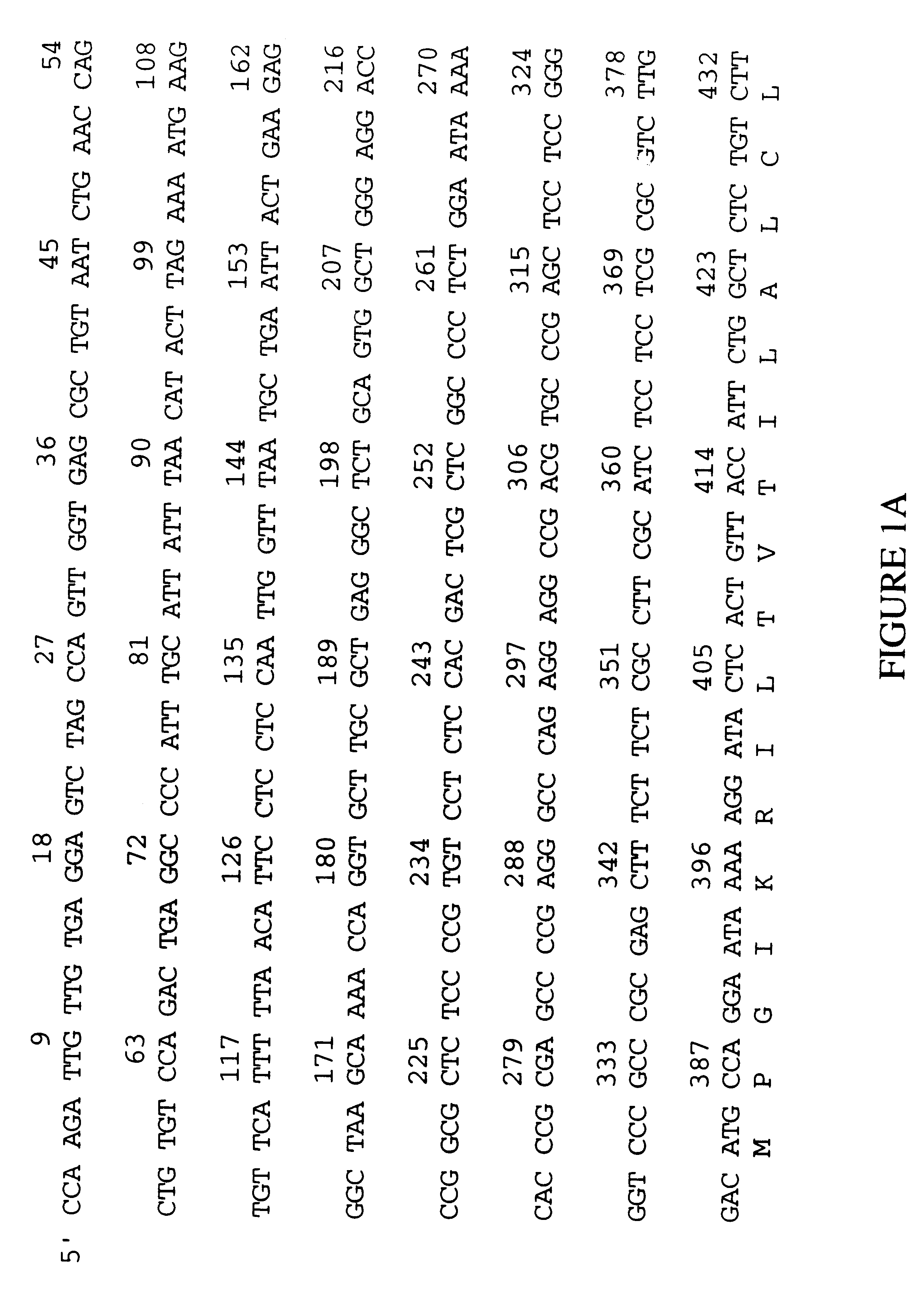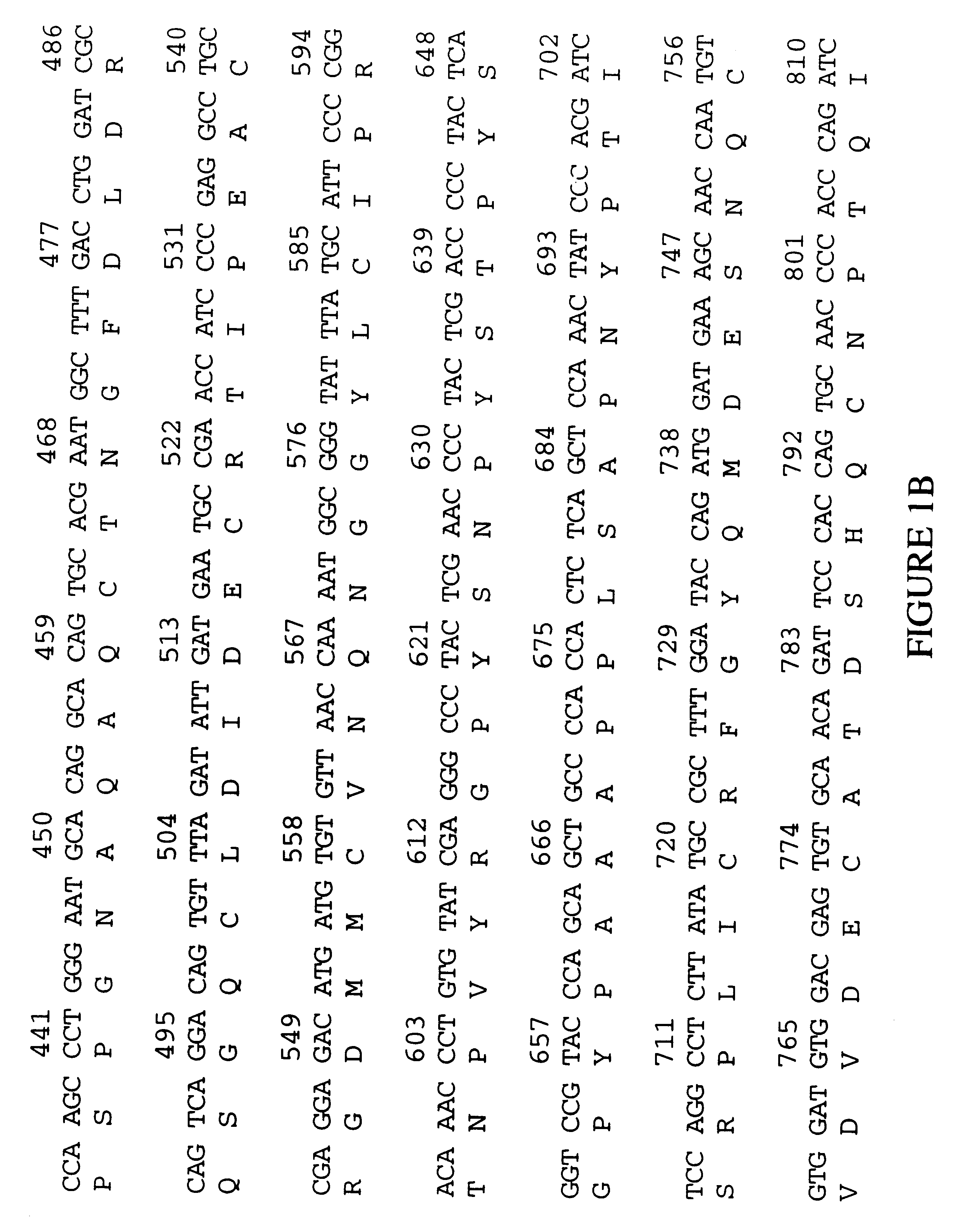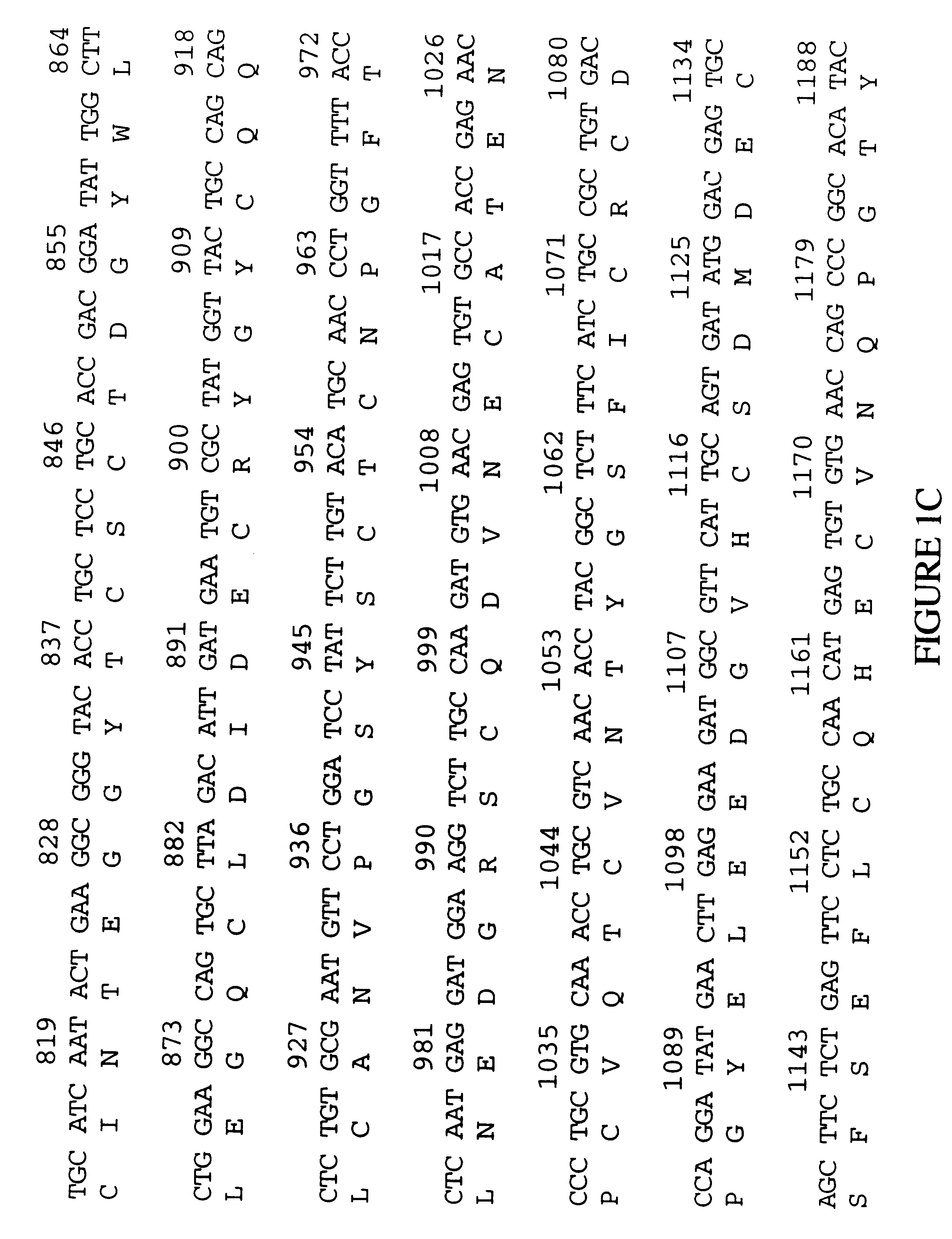Human extracellular matrix proteins
a technology of extracellular matrix and protein, applied in the field of human extracellular matrix protein, can solve the problems of unclear interaction between the majority and other ecmps or with molecules residing within the cell membrane, and achieve the effect of preventing the development or further progression of cancer
Inactive Publication Date: 2001-10-16
INCYTE
View PDF5 Cites 39 Cited by
- Summary
- Abstract
- Description
- Claims
- Application Information
AI Technical Summary
Benefits of technology
Another method which may be used to retrieve unknown sequences is that of Parker, J. D. et al. (1991; Nucleic Acids Res. 19:3055-3060). Additionally, one may use PCR and nested primers to walk genomic DNA. This process avoids the need to screen libraries and is useful in finding intron / exon junctions.
The nucleic acid sequence of the Incyte Clone 45517 or 162177 was used to design oligonucleotide primers for extending a partial nucleotide sequence to full length. One primer was synthesized to initiate extension in the antisense direction, and the other was synthesized to extend sequence in the sense direction. Primers were used to facilitate the extension of the known sequence "outward" generating amplicons containing new, unknown nucleotide sequence for the region of interest. The initial primers were designed from the cDNA using OLIGO 4.06 primer analysis software (National Biosciences), or another appropriate program, to be about 22 to about 30 nucleotides in length, to have a GC content of 50% or more, and to anneal to the target sequence at temperatures of about 68.degree. to about 72.degree. C. Any stretch of nucleotides which would result in hairpin structures and primer-primer dimerizations was avoided.
Problems solved by technology
Whilst a great number of ECMPs have been isolated, it still remains unclear how the majority interact with other ECMPs or with molecules residing within the cell membrane.
Method used
the structure of the environmentally friendly knitted fabric provided by the present invention; figure 2 Flow chart of the yarn wrapping machine for environmentally friendly knitted fabrics and storage devices; image 3 Is the parameter map of the yarn covering machine
View moreImage
Smart Image Click on the blue labels to locate them in the text.
Smart ImageViewing Examples
Examples
Experimental program
Comparison scheme
Effect test
examples
I cDNA Library Construction
the structure of the environmentally friendly knitted fabric provided by the present invention; figure 2 Flow chart of the yarn wrapping machine for environmentally friendly knitted fabrics and storage devices; image 3 Is the parameter map of the yarn covering machine
Login to View More PUM
| Property | Measurement | Unit |
|---|---|---|
| Temperature | aaaaa | aaaaa |
| Temperature | aaaaa | aaaaa |
| Temperature | aaaaa | aaaaa |
Login to View More
Abstract
The invention provides two human extracellular matrix proteins (ECMP) and polynucleotides which identify and encode ECMP. The invention also provides expression vectors, host cells, agonists, antibodies and antagonists. The invention also provides methods for treating disorders associated with expression of ECMP.
Description
This invention relates to nucleic acid and amino acid sequences of human extracellular matrix proteins and to the use of these sequences in the diagnosis, prevention, and treatment of cancer and immune disorders.Many eukaryotic cells are enveloped by an extracellular matrix of proteins that provide structural support, cell and tissue identity, and autocrine, paracrine and juxtacrine properties for the cell within its environment (McGowan, S. E. (1992) FASEB J. 6:2895-2904). The diverse biochemistry of extracellular matrix proteins (ECMP) is indicative of the many, often overlapping, roles that are attributed to each distinct molecule (cf. Grant, D. S. and Kleinman, H. K. (1997) E.X.S. 79:317-333). Whilst a great number of ECMPs have been isolated, it still remains unclear how the majority interact with other ECMPs or with molecules residing within the cell membrane. Many ECMPs have been associated with tissue growth and cell proliferation, others with tissue or cell differentiation,...
Claims
the structure of the environmentally friendly knitted fabric provided by the present invention; figure 2 Flow chart of the yarn wrapping machine for environmentally friendly knitted fabrics and storage devices; image 3 Is the parameter map of the yarn covering machine
Login to View More Application Information
Patent Timeline
 Login to View More
Login to View More IPC IPC(8): C07K14/435C07K14/47C12Q1/68A61K38/00A61K39/00C12N15/09C12N1/15C12N1/19C12N1/21C12N5/10C12P21/02
CPCC07K14/47C12Q1/6883A61K38/00A61K39/00C07K2319/00
Inventor BANDMAN, OLGACORLEY, NEIL C.GUEGLER, KARL J.
Owner INCYTE
Features
- R&D
- Intellectual Property
- Life Sciences
- Materials
- Tech Scout
Why Patsnap Eureka
- Unparalleled Data Quality
- Higher Quality Content
- 60% Fewer Hallucinations
Social media
Patsnap Eureka Blog
Learn More Browse by: Latest US Patents, China's latest patents, Technical Efficacy Thesaurus, Application Domain, Technology Topic, Popular Technical Reports.
© 2025 PatSnap. All rights reserved.Legal|Privacy policy|Modern Slavery Act Transparency Statement|Sitemap|About US| Contact US: help@patsnap.com



